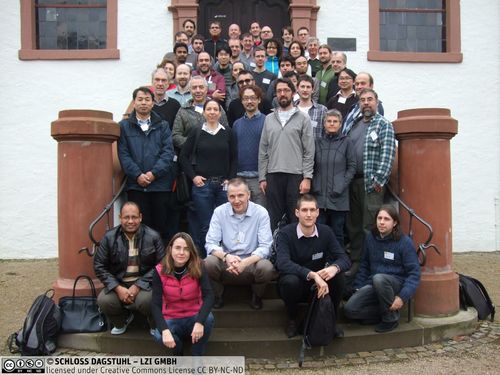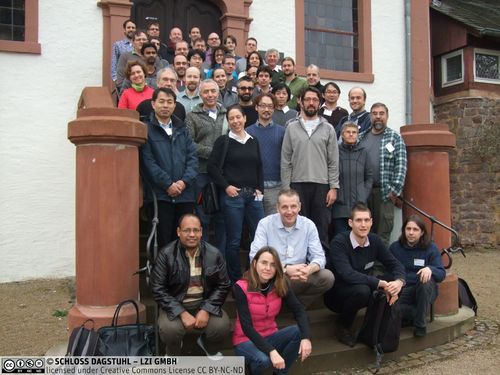Dagstuhl Seminar 14481
Multiscale Spatial Computational Systems Biology
( Nov 23 – Nov 28, 2014 )
Permalink
Organizers
- David Gilbert (Brunel University - London, GB)
- Monika Heiner (BTU Cottbus, DE)
- Koichi Takahashi (Osaka University, JP)
- Adelinde M. Uhrmacher (Universität Rostock, DE)
Contact
- Susanne Bach-Bernhard (for administrative matters)
Dagstuhl Seminar Wiki
- Dagstuhl Seminar Wiki (Use personal credentials as created in DOOR to log in)
Shared Documents
- Dagstuhl Materials Page (Use personal credentials as created in DOOR to log in)
This seminar explores challenges arising from the need to model and analyse complex biological systems at multiple scales (spatial and temporal), and falls within the general remit of Computational Systems Biology.
Multiscale modelling goes beyond the traditional approach of modelling at just one spatial/temporal scale. Until now most models have largely ignored locality within the cell, or cell-cell interactions. However, with the insight that spatial phenomena like localisation and crowding have a considerable influence on reaction processes and many processes cannot be understood with reference to one organisation level only (intra- or inter-cellular dynamics), the need for effective and efficient modelling and simulation approaches arises.
The challenges for computer science and mathematics include the development of suitable modelling approaches and associated tools to create coherent descriptions of biological systems by integrating several spatial and/or temporal scales, and methods for the simulation and analysis of the models.
The overall motivation for this seminar is the exchange of the most recent advances in these methods. A distinguishing factor of the seminar is the modelling competition – where different approaches are explored, in order to better understand what are their benefits.
The seminar brings together researchers working in modelling and analysis of biological systems with diverse professional backgrounds, such as informaticians, mathematicians, engineers, biologists, physicians.
This seminar built on the tradition of two previous Dagstuhl seminars on Formal Methods in Molecular Biology in 2009 and 2011 (Seminar 09091, Seminar 11151), but with a special focus on multiscale and spatial modeling and simulation.
Multiscale modelling goes beyond the traditional approach of modelling at just one spatial/temporal scale or organizational level. Until now most models have largely ignored locality within the cell, or cell-cell interactions. However, with the insight that spatial phenomena like localisation and crowding have a considerable influence on reaction processes and many processes cannot be understood with reference to one organisation level only (intra- or inter-cellular dynamics), the need for effective and efficient modelling and simulation approaches arises.
The challenges for computer science and mathematics include the development of suitable modelling approaches and associated tools to create coherent descriptions of biological systems by integrating several spatial and/or temporal scales, and methods for the simulation and analysis of the models.
The overall motivation for this seminar was the exploration of the most recent advances in these methods. The seminar brought together researchers working in modelling and analysis of biological systems with diverse professional backgrounds, including informaticians, mathematicians, engineers, biologists, physicians.
A distinguishing factor of the seminar was the modelling exercise - where teams explored different modelling paradigms, in order to better understand the details of the approaches, their challenges, potential applications, and their pros and cons. This activity was carried out in a collaborative and self-directed manner using the Open Space Technology approach as evidenced by a high degree of communication both within and between the teams. Eight teams were formed, and reports from five of them are included in this document. The teams were formed around the following focii:
- Small GTP-ase pathway.
- Continuous multiscale models for biological tissue.
- Simulating macromolecular crowding with particle and lattice-based methods
- Multiscale modeling of S1P metabolism, secretion and signaling
- DNA structural dynamics.
- Dictyostelium discoideum: Aggregation and Synchronisation of Amoebas in Time and Space.
- Towards a standard exchange format for spatial, multilevel multicellular models.
- Model checking for multiscale spatial biological systems.
The participants decided to take forward the activities in the future outside Dagstuhl, with the goals of carrying out collaborative research, producing scientific papers and applying for larger scale funded international research projects.
 David Gilbert, Monika Heiner, Koichi Takahashi, and Adelinde M. Uhrmacher
David Gilbert, Monika Heiner, Koichi Takahashi, and Adelinde M. Uhrmacher
- Steven Andrews (Frederic Hutchinson Cancer Center - Seattle, US) [dblp]
- Satya Arjunan (Osaka University, JP) [dblp]
- Gianfranco Balbo (University of Turin, IT) [dblp]
- Ezio Bartocci (TU Wien, AT) [dblp]
- Marco Beccuti (University of Turin, IT) [dblp]
- Arne Bittig (Universität Rostock, DE) [dblp]
- Mary Ann Blätke (Universität Magdeburg - IBIO, DE) [dblp]
- Luca Bortolussi (Universität des Saarlandes, DE) [dblp]
- Lutz Brusch (TU Dresden, DE) [dblp]
- Alfonso Bueno-Orovio (University of Oxford, GB) [dblp]
- Kevin Burrage (University of Oxford, GB) [dblp]
- Francesca Cordero (University of Turin, IT) [dblp]
- Walter de Back (TU Dresden, DE) [dblp]
- Andreas Deutsch (TU Dresden, DE) [dblp]
- Maciej Dobrzynski (University College - Dublin, IE) [dblp]
- Dirk Drasdo (INRIA - Le Chesnay, FR) [dblp]
- Radek Erban (University of Oxford, GB) [dblp]
- Martin Falk (Linköping University, SE) [dblp]
- Flavio Fenton (Georgia Institute of Technology, US) [dblp]
- Jérôme Feret (ENS - Paris, FR) [dblp]
- Chiara Fornari (University of Turin, IT) [dblp]
- Akira Funahashi (Keio University, JP) [dblp]
- Anna Gambin (University of Warsaw, PL) [dblp]
- David Gilbert (Brunel University - London, GB) [dblp]
- Simon Hardy (Université Laval - Québec, CA) [dblp]
- Monika Heiner (BTU Cottbus, DE) [dblp]
- Mostafa Herajy (Port Said University, EG) [dblp]
- Dagmar Iber (ETH Zürich - Basel, CH) [dblp]
- Kazunari Kaizu (RIKEN Quantitative Biology Center - Osaka, JP) [dblp]
- Andrzej M. Kierzek (University of Surrey, GB) [dblp]
- Tetsuya J. Kobayashi (University of Tokyo, JP) [dblp]
- Marek Kochanczyk (Polish Academy of Sciences - Warsaw, PL) [dblp]
- Fei Liu (Harbin Institute of Technology, CN) [dblp]
- Guillaume Madelaine (University of Lille I, FR) [dblp]
- Wolfgang Marwan (Universität Magdeburg - IBIO, DE) [dblp]
- Carsten Maus (DKFZ - Heidelberg, DE) [dblp]
- Sebastian Nähring (Universität Rostock, DE) [dblp]
- Joachim Niehren (INRIA - University of Lille 1, FR) [dblp]
- Ovidiu Parvu (Brunel University, GB) [dblp]
- Christian Rohr (BTU Cottbus, DE) [dblp]
- Guido Sanguinetti (University of Edinburgh, GB) [dblp]
- Koichi Takahashi (Osaka University, JP) [dblp]
- Yuichi Togashi (Hiroshima University, JP) [dblp]
- Adelinde M. Uhrmacher (Universität Rostock, DE) [dblp]
Related Seminars
Classification
- bioinformatics
- modelling / simulation
- semantics / formal methods
Keywords
- multiscale
- spatial
- modelling
- simulation
- analysis
- systems biology



 Creative Commons BY 3.0 Unported license
Creative Commons BY 3.0 Unported license
